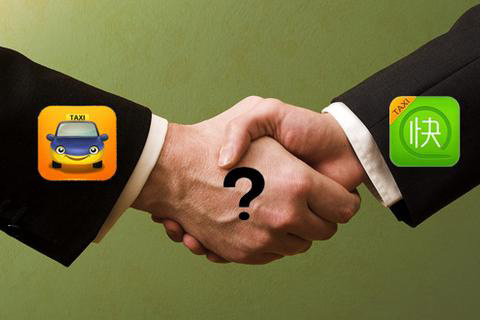

 |
| (File Photo) |
Users worry Didi, Kuaidi union means end to generous subsidies
Didi Dache and Kuaidi Dache, China's two most popular taxi-hailing apps, announced on the Valentine's Day that they would hook up to launch one of the world's biggest mobile platforms for on-demand transportation services.
Subsidies for both taxi drivers and passengers, a key tactic the firms have applied to rope in app users, will inevitably fall following the merger, analysts said, with some users stating that they might uninstall the apps if the subsidies gradually taper off.
The brands will be retained and the firms would operate independently, said a joint announcement posted Saturday on the public WeChat account of Didi Dache.
Didi CEO Cheng Wei and Kuaidi CEO Lü Chuanwei will assume the role of co-chief executive, and there will be no change to both firms' personnel structure, according to the announcement, which stated a news conference introducing the new model will be held after the weeklong Spring Festival holidays that begin on Wednesday.
The announcement came just a few days after rumors of a tie-up flooded a variety of media outlets but were soon denied as untrue by Didi.
Didi and Kuaidi, backed by Chinese Internet behemoth Tencent Holdings and e-commerce leviathan Alibaba Group Holding, have been embroiled in a money burning battle to vie for users in the world's biggest smartphone market.
The latest available statistics from Beijing-based market research firm Analysys International showed that as of December 2014, the country's cumulative taxi-hailing user accounts had reached 172 million, with Kuaidi accounting for 56.5 percent of the total and Didi taking 43.3 percent.
Both Tencent and Alibaba are supportive of the merger, the largest ever in China's Internet sector, China News Service reported on Saturday, citing Cheng, Didi's chief executive.
Cheng did not disclose the value of the deal, but Reuters said in an article on Saturday "the combined entity would be valued at roughly $6 billion," citing an unidentified source familiar with the deal.
The share holding structure of the combined entity is still unknown.
Neither firm could be immediately reached for further comment.
The deal is set to call an end to the bitter competition between the firms, Zhang Xu, an industry analyst at Analysys International, told the Global Times.
The majority of users have installed both apps, the use of which depends on the amount of subsidies offered by each service, said Zhang, who believes the combined entity would mean an end to their lavish spending on subsidies and instead invest more in enhancing the apps' user experience.
To sustain their battle for a bigger slice of the market, the two firms have received over $1 billion from private investors over recent months, said the Reuters report.
On top of that, the firms which also operate car-hiring services, Kuaidi One and Didi Zhuanche, are seen as shifting their focus to car-hiring services in the wake of the merger to take on the likes of Uber.
US car-hiring firm Uber unveiled a team-up with Chinese search giant Baidu Inc in December 2014 aimed at reaching out to China's growing car-hiring market.
The linkup between Didi and Kuaidi would decidedly heat up competition in the car-hiring market, Zhang Yi, CEO of Guangzhou-based market research firm iiMedia Research, told the Global Times.
For normal app users, however, the grand vision might not be able to soothe their anxiety over possible cuts in subsidies.
"I may give up using the apps if the subsidies are removed," Judy Yang, a frequent taxi-hailing user working for a foreign-backed firm in Beijing, told the Global Times.
A Beijing taxi driver surnamed Qi also expressed similar views when reached by the Global Times on Saturday.
An online poll by news portal sina.com.cn which had surveyed nearly 4,000 respondents as of 9:20 pm Saturday evening showed 50.3 percent of the total participants do not care about the deal itself, but 59.7 percent of them said they would choose not to use the taxi-hailing apps if the merger results in an cancellation of subsidies.
There are also concerns over whether the deal will face an anti-monopoly probe given the two firms have now seized almost 100 percent of the entire taxi-hailing market.
Zhang at iiMedia Research said that "an antitrust investigation should be launched in theory, but the country's anti-monopoly probes have yet to cover the Internet sphere."
None of the three anti-monopoly regulators, the National Development and Reform Commission, the Ministry of Commerce, and the State Administration for Industry and Commerce, could be reached for comment.
 PLA soldiers operating vehicle-mounted guns in drill
PLA soldiers operating vehicle-mounted guns in drill Beauties dancing on the rings
Beauties dancing on the rings Blind carpenter in E China's Jiangxi
Blind carpenter in E China's Jiangxi Top 10 highest-paid sports teams in the world
Top 10 highest-paid sports teams in the world In photos: China's WZ-10 armed helicopters
In photos: China's WZ-10 armed helicopters UFO spotted in several places in China
UFO spotted in several places in China Certificates of land title of Qing Dynasty and Republic of China
Certificates of land title of Qing Dynasty and Republic of China  Cute young Taoist priest in Beijing
Cute young Taoist priest in Beijing New film brings Doraemon's life story to China in 3D
New film brings Doraemon's life story to China in 3D Obama is sowing discontent in S.China Sea
Obama is sowing discontent in S.China Sea Rescuers work through night to reach cruise ship survivors
Rescuers work through night to reach cruise ship survivors Driving through limbo
Driving through limbo Facing down MERS
Facing down MERSDay|Week